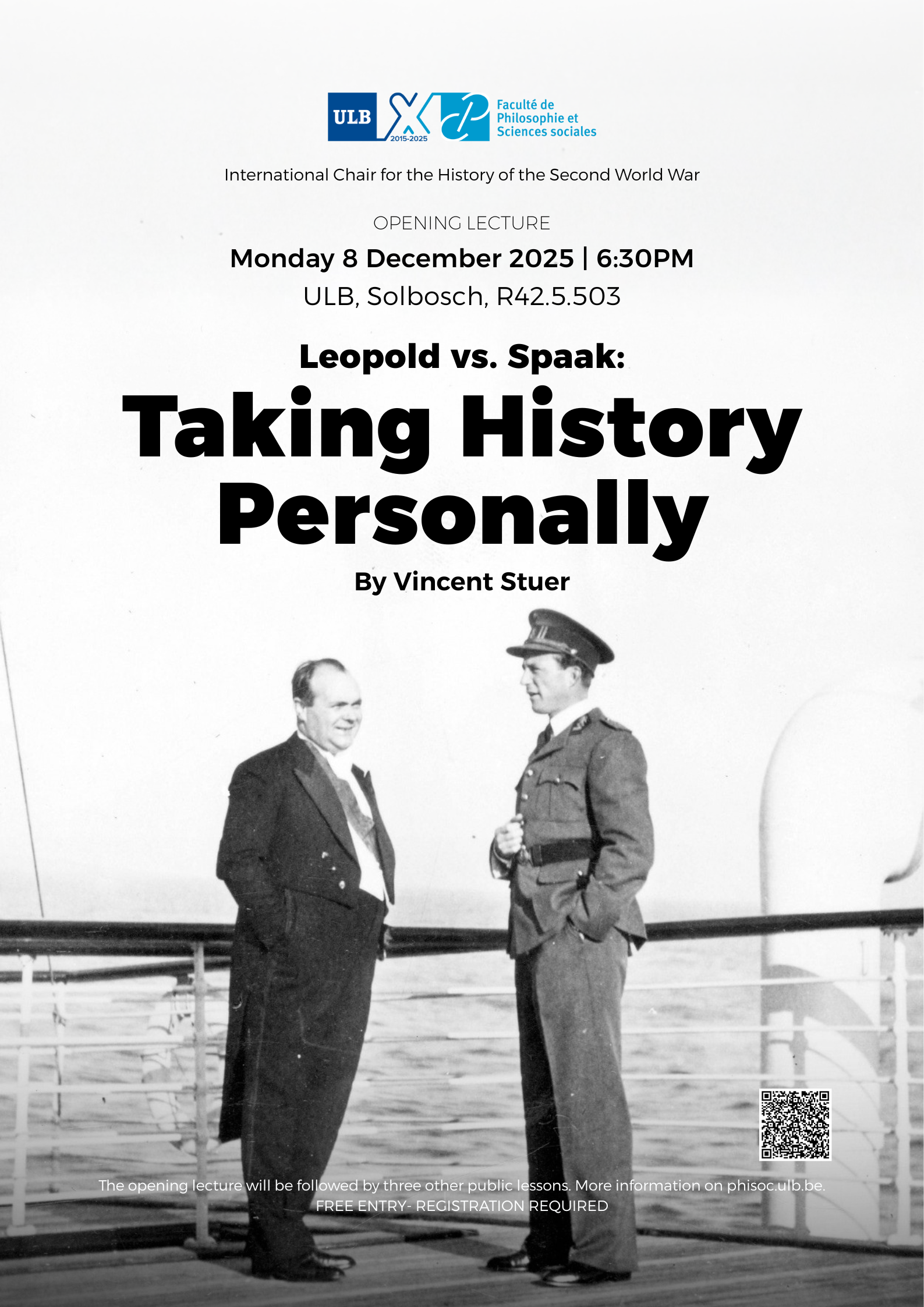-
Partager cette page
International Chair for the History of the Second World War: Taking History Personally by Vincent Stuer

Jean-Benoît PILET, Doyen de la Faculté de Philosophie et Sciences sociales,
Thomas BERNS, vice-Doyen de la Faculté de Philosophie et Sciences sociales,
Laurent BAVAY, Président du Département d’Histoire, Arts et Archéologie,
Pieter LAGROU, Professeur d’Histoire et responsable académique de la chaire,
Baudouin VELGE, représentant du fonds baron Jean-Charles Velge,
ont l'honneur de vous inviter à la leçon inaugurale de la
CHAIRE INTERNATIONALE D’HISTOIRE DE LA DEUXIÈME GUERRE MONDIALE
2025-2026
International Chair for the History of the Second World War / Internationale Leerstoel voor de Geschiedenis van de Tweede Wereldoorlog
Taking History Personally
by Vincent Stuer
Writer and playwright
Spokesman of the Renew Europe group in the European Parliament
Opening lecture: Leopold vs. Spaak: Taking History Personally
Monday 8 December 2025 at 6:30PM
Auditorium R42.5.503 (DRION)
The opening lecture will be followed by the Baron VELGE Award and a reception in the Coin Culture (Av. Paul Héger, Building U).
The International Chair for the History of the second World War organizes annually a series of lectures by a historian who has distinguished her or himself by his or her recent contributions to the field. The Chair has consistently taken pride in honoring scholars who went against the grain with innovative interpretations and endeavored to show that the history of the last global conflict also allows us to understand the contemporary world. The list of laureates of the previous 12 editions highlights this (Timothy Snyder, Tsuyoshi Hasegawa, Filippo Focardi, Andrii Portnov, Kerstin von Lingen, Pawel Machcewicz, Florent Brayard, Philippe Sands, Giorgos Antoniou, Claire Andrieu, Phillips Payson O’Brien, Raz Segal).
For its thirteenth edition, The International Chair for the History of the second World War at the Université Libre de Bruxelles welcomes Vincent Stuer who is a Belgian writer, playwright and speechwriter, currently spokesman of the Renew Europe group in the European Parliament.
He is the author of ‘Unsung’ (KVS/Skagen, 2017, with Valentijn Dhaenens), a monologue about the psychology of politicians; ‘Hoogmoed’, the biography of a fascist who ends up in the resistance (B&L 2020); and non-fictions books, ‘Kleinstaterij!’ (Bezige Bij, 2014) and ‘Curb your Idealism—the EU as seen from within’ (ASP/VUB Press, 2018), both tracing the history of the European idea and its relevance for contemporary politics.
The starting point for the lecture series is ‘Rexit’, his book about the Belgian royal question of 1940-50, which he adapted for the stage with actors Bruno Vanden Broecke and Valentijn Dhaenens (B&L/KVS, 2024).
In Leopold vs. Spaak: Taking history personally (8 December) Vincent explains his decision to recount the country’s wartime and postwar events through the double perspective of Leopold III and his foreign minister, Paul-Henri Spaak. If form follows function, he argues, literary techniques and theatrical tools have a lot to offer to the historian, though they come with plenty of risks attached. Because the way we tell our stories has far-reaching implications for more fundamental personal and political questions: What is history, and what is it for?
Free admission - REGISTRATION REQUESTED
The inaugural lesson will be followed by three other lessons :
Monday 16 February, 6PM – Auditorium R42.5.503 (DRION)
When the facts change, I change my mind, sees the campaign around the royal question as a way of dealing with the past, each camp revisiting the history of the war in light of its postwar needs, hopes and fears. At its heart were contradicting interpretations of issues like neutrality, democracy, sovereignty and monarchy, that one side deemed to have become surpassed by events, while the other clung to them more than ever. In Vincent’s telling, Leopold and Spaak become political archetypes, one steeped in tradition and unbending in the legitimacy that history brings, the other flexible and feeling his way towards the future—both typical for their side of the debate, and highly relevant for today’s divisive politics.
Monday 23 March, 6PM - Auditorium R42.5.503 (DRION)
The people versus democracy looks at the political and institutional lessons from the royal question, the political passions it unleashed until it brought the country to the brink of civil war. While Leopoldist opinion saw a public consultation as the only way to reconnect King and country and restore constitutionality, to his opponents it brought back memories of the authoritarian tendencies the war should have ended. The collision between the two formed the Big Bang of Belgium’s political system for decades to come… until recently, when another high-pressure era raised similar questions of popular politics and populist posturing, the merits of representative government and the conditions on which it depends.
Monday 30 March, 6PM - Auditorium R42.5.503 (DRION)
Remember to forget considers the struggle countries go through after wars and occupation, civil strife or episodes of authoritarianism. If democracy is a way to start over, history is at the heart of the public debate. Working through events of the past becomes a political necessity. For Europe, where the past is often so painful and powerful it overwhelms the future, European integration has always been a way to overcome history—treading a fine line between remembrance and forgetfulness. Because when history remains undigested, it can get really personal.
PLAN ULB - ACCÈS : Campus du SOLBOSCH
INFORMATIONS : phisoc.ulb.be
CONTACT : com.phisoc@ulb.be
Chaire organisée pour la treizième fois par la Faculté de Philosophie et Sciences sociales de l’ULB, grâce à la générosité de feu le Baron Jean-Charles VELGE, décédé le 29 mai 2010, qui tenait à honorer la mémoire de Jean Vanwelkenhuyzen, historien de la Deuxième Guerre Mondiale.

